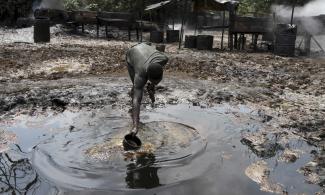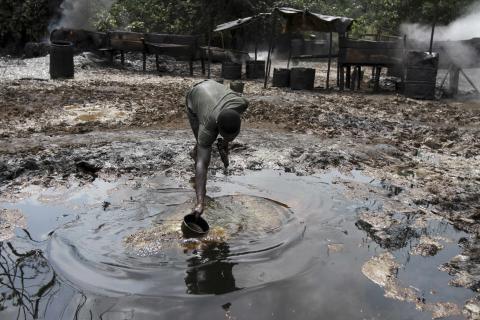
The federal government does not know; the Nigerian National Petroleum Corporation (NNPC) does not know; our security agencies cannot tell; and even the foreign multinational oil companies either do not know also or are trying to play politics with figures of stolen crude for selfish gains.
When a nation of people is given to trifling or undue flippancy, it shows in everything that concerns such a country. How can we explain to decent minds or rather serious peoples outside this country that Nigeria, in all honesty, does not know even with a near-certainty, the amount in terms of volume of crude oil stolen from its facilities on daily basis?

The federal government does not know; the nation’s apex oil concern and our representative in the oil and gas sector, the Nigerian National Petroleum Corporation (NNPC) does not know; our security agencies cannot tell; and even the foreign multinational oil companies either do not know also or are trying to play politics with figures of stolen crude for selfish gains and to blackmail the government. Haba! Na so country dey run?
Government says one thing, the foreign operators say a different thing, the NNPC has its own ideas, and ofcourse the politicians depending on the side of the divide they talk from, throw more confusion into the jig-saw puzzle. It is a big shame!
Is it deliberate mischief or a true lack of accurate information that not even the producing oil companies could stick to figures? Is it not shameful or rather criminal that the gulf between some of the figures thrown to the public as stolen crude oil are so wide they could swallow even the public trust on this whole thing?
It has been severally alleged and corroborated by some who should know the truth, that some of the figures out there on crude oil theft are very unrealistic and overtly exaggerated for purposes that span from corruption, politics, blackmail to outright gullibility or do we say ignorance of the ruling class.
The chairman of the federal government taskforce on crude oil theft, Emmanuel Uduaghan, governor of Delta State, while speaking at an African Business Roundtable workshop on combating emerging threats held on the sidelines of the recently-concluded United Nations General Assembly in New York, said “The persistence of crude oil theft in the Niger Delta region where over 400,000 barrels per day are stolen may threaten world peace and democracy if concerted action is not taken to curb it.”
Also, the Coordinating Minister for the Economy and Minister of Finance, Ngozi Okonjo-Iweala, in one of her numerous appearances at the House of Representatives Joint Committee on Appropriation/Finance in Abuja also had it on record that, “We are losing revenue; 400,000 barrels of crude oil are lost on a daily basis due to illegal bunkering, vandalism and production shut-in.”
Her words: “I have to clarify that it is not as if the entire 400,000 barrels is stolen, no. What happens is that whenever the pipelines are attacked and oil is taken, there is a total shutdown. All the quantity of oil produced for that day will be lost because it means government cannot sell it and it means a drop in revenue.”
Of course, the above clearly show that those in government believe the nation loses about 400,000 barrels of oil every day to thieves. How and where they got this figure is at best blurred and at worst obscured because those who should be giving the government figures of produced crude oil (available plus stolen), have different ideas.
The former Group Managing Director of the Nigerian National Petroleum Corporation (NNPC), Andrew Yakubu, before he was removed had said that “in 2013 alone, the country lost 300,000 barrels of crude oil per day (bpd).”
The Nigerian Navy through the Director, Nigerian Navy Transformation Office, Austen Oyagha, declared recently in Calabar, Cross River State, that “the country lost an estimated average of 55,210 barrels per day or monthly average of 1,656,281 barrels in 2013. Thus, Nigeria oil losses due to crude oil theft translate to almost $20 billion yearly in deficit to Nigeria’s economy. These losses do not only undermine Nigeria’s economy in terms of foreign exchange deficit, they also pose a threat to national security for Nigerians.”
Shell Petroleum Development Company of Nigeria (SPDC), the company believed to be worst hit by this menace of crude oil theft, also has not helped the matter not to talk of helping itself. At every opportunity, the company throws figures around as if they don’t know what they produce and what got missing from what they produced.
The company’s managing director, Mutiu Sumonu, who was represented by the company’s Ogoni Restoration Project Manager, Augustine Igbuku, had cried out at the recently concluded Delta State oil and gas stakeholders conference held in Warri that “as much as 150,000 barrels of oil were being stolen each day from Nigeria, adding that most of the oil was illegally shipped and sold in international markets, while some quantities of crude were being refined along the creeks.”
Meanwhile, in another setting (Shell 2013 annual report) the same Shell said, “In 2013, the number of spills from the company’s operations caused by sabotage and theft increased to 157 from 137 in 2012, whilst production losses due to crude oil theft, sabotage and related temporary shut- in. On the average, around 32000 barrels per day (bpd) were stolen from SPDC pipelines and other facilities, whilst joint venture lost production of around 174000bpd due to shut downs related to theft and other third party interference.”
If Shell cannot harmonize the overall loss in terms of accurate quantity of its produced oil, then, there is something not very transparent in these crude oil theft campaigns by the Anglo Dutch operator.
By its own derivation, the London-based research group Chatham House believes “Oil is being stolen on an ‘industrial scale’ in Nigeria and the country’s politicians and security officials are among those profiting…” Chatham House estimated that “an average of 100,000 barrels is stolen daily.” Who gave the Chatham House this figure-Shell, NNPC or the federal government?
The conflicting figures of actual loss in terms of volume of crude oil no doubt also reflects in the conflicting estimates with regards to the amount of losses in revenue terms due to crude oil theft and this is where foul play is seriously suspected.
Could there be a deliberate over-blowing of the actual quantity of crude oil lost to thieves for pecuniary reasons by the foreign multinational operators of the NNPC joint ventures?
Could some of the operators be deliberately aiding the stealing of crude oil from their facilities to ultimately create a situation where they can defraud the NNPC in sharing of produced crude or proceeds of it?
Are the operators of the sector dangling conflicting and most times unrealistic figures to blackmail the federal government and NNPC especially as some of these operators are hell-bent on establishing the impression it is no longer safe to do business in the Nigerian onshore and near-shore arena at least to justify their fake divestment? How can you divest from one part of a zone and turn around to beg to invest in another part of the same “unsafe terrain”? is this not deceit?
Royal Dutch Shell disclosed recently that during its 2013 financial year, it lost about $1 billion to crude oil theft and various oil and liquefied natural gas disruptions in its Nigerian operation.
Few days later, Shell Nigeria rebutted the claim describing it as incorrect. So how did the parent company got the figures that generated what was released as the total loss in the Nigerian operation? The statement by Shell Nigeria went on to indicate that the actual amount lost to operational difficulties in Nigeria was $250 million. So how do you reconcile this?
The big question the federal government should answer is: how much crude oil in terms of volume does Nigeria lose daily to oil thieves? Shut-ins cannot be the same thing as produced and stolen crude. Is it not curious that the federal government dangles the highest figures as stolen crude? What do they want to achieve by jacking up figures from the NNPC and the IOCs?
The NNPC and its joint venture partners are supposed to know what each operator pumps out daily and from what well, field and through what flowstation to the export terminals or to our refineries. So we are not talking of the oil we did not produce.
Nigerians would want to know what the nation is losing everyday deducting from the actually produced volume. At least, all the stakeholders in this crude oil stealing thing- the federal Government/DPR, NNPC, and the operating IOCs should for transparency or rather for decency sake meet and harmonise their figures because the current situation has become very embarrassing.
IFEANYI IZEZE lives in Abuja and can be reached at [email protected].